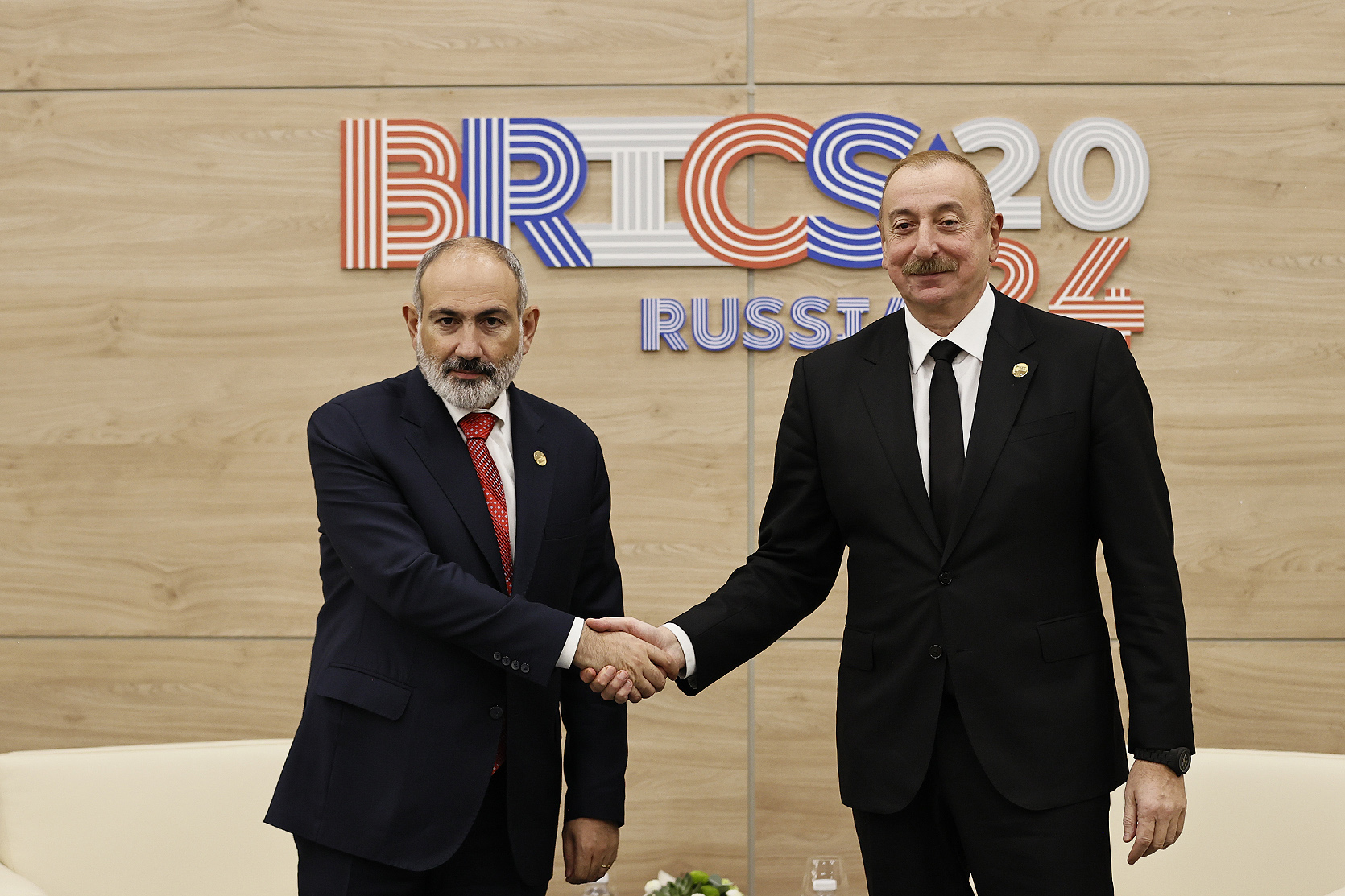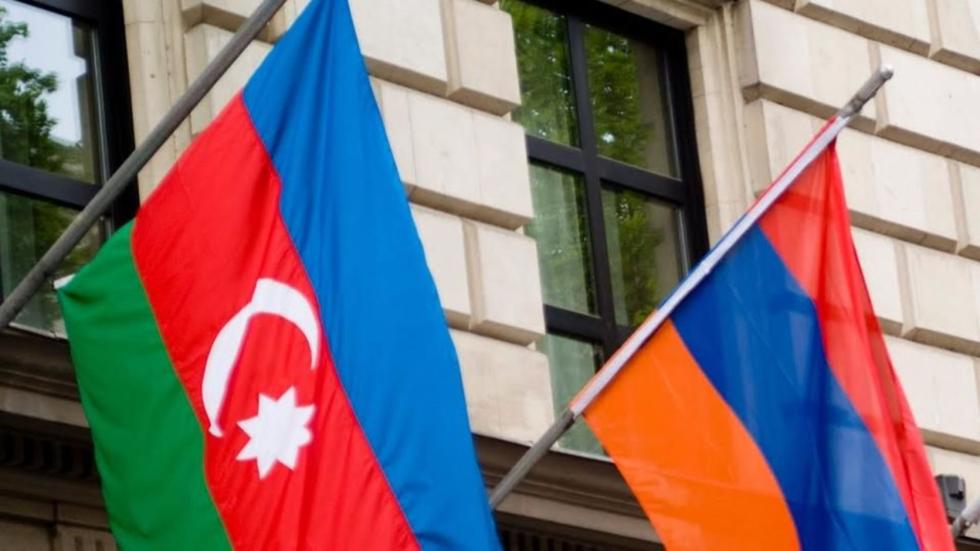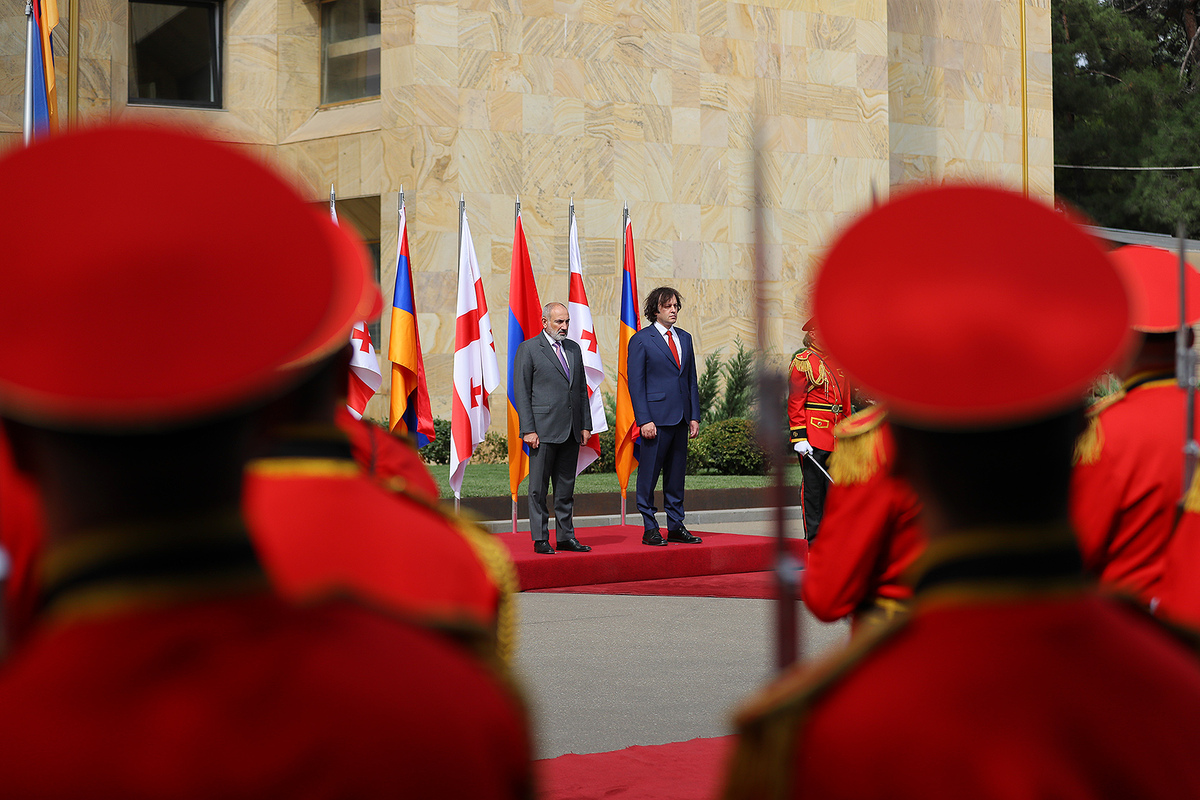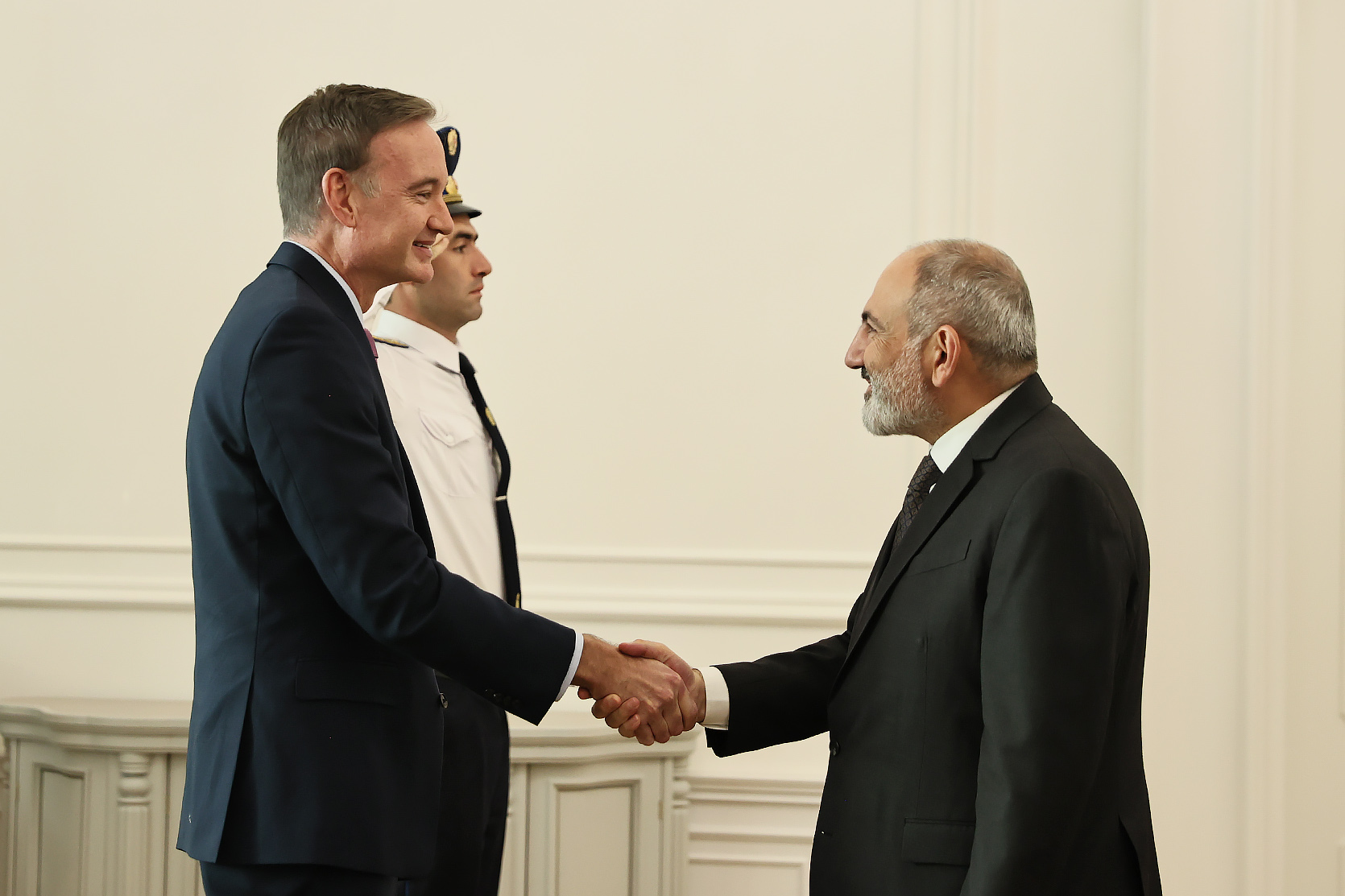
Pashinyan-Aliyev meeting in Kazan
The Prime Minister of Armenia and the President of Azerbaijan held talks in Kazan at the BRICS summit. The meeting, which lasted over an hour, was not announced in advance.
Following the discussions, the Armenian government’s press office reported that Pashinyan and Aliyev “had discussions on advancement of bilateral peace agenda, including peace agreement, delimitation and demarcation of borders and other issues of mutual concern.” Notably absent from the official statement was any mention of unblocking regional transport and communications – an issue that both leaders highlighted in their speeches at the Kazan summit.
The official statement also indicated that Pashinyan and Aliyev directed their foreign ministers to “continue bilateral negotiations on the Agreement on Peace and Establishment of Interstate Relations with the aim of its finalization and conclusion in the shortest possible period.”
“The Armenian-Azerbaijani talks in Kazan held significant value for Moscow, as it sends a message to the West that this is not a situation outside their control,” political analyst Lilit Dallakyan told JAMnews.
“Aliyev often echoes Peskov, saying that peace in the South Caucasus is unattainable without Russia. Moscow is well aware of the Armenian public’s negative sentiment toward it following the 2020 44-day war. This meeting serves as a reminder that despite this sentiment, Armenia still turns to Russia to resolve its issues.”
No specific agreements were reported immediately following the Pashinyan-Aliyev meeting. However, by the time of this article’s publication, it was confirmed that the Armenian and Azerbaijani presidents approved a framework for joint border delimitation commission work, previously ratified by Armenia’s parliament.
Key details and highlights of Pashinyan and Aliyev’s statements in Kazan, along with political analysis by Lilit Dallakyan.
- Armenian Parliament ratified border delimitation regulations as Baku’s intentions remain unclear
- 56% of Armenians back a peace deal with Azerbaijan: IRI survey
- “Baku wants Yerevan to acknowledge its hegemony” – Armenian political analyst
“Concerns over Armenia’s Constitution dispelled”
During his speech at the BRICS summit, the Prime Minister of Armenia discussed the ratification of the framework for joint commission work on the delimitation of the Armenia-Azerbaijan border:
“Once this document takes effect in both countries, we will be able to accelerate the border delimitation process between Armenia and Azerbaijan according to the foundational principles of the 1991 Alma-Ata Declaration, [which concerns mutual recognition of administrative borders as they stood at the dissolution of the USSR]”.
Pashinyan emphasized that the Armenian Constitutional Court’s decision regarding this document “has definitively dispelled all concerns and eliminated arguments suggesting that Armenia’s constitution contains territorial claims against neighboring countries.” He reiterated that such concerns and remarks are baseless and illegitimate.
Recently, Baku has repeatedly claimed that the Armenian constitution presents a primary obstacle to signing a peace treaty due to alleged territorial claims against Azerbaijan. However, Armenia’s constitution contains no wording that would justify such concerns. The constitution merely references the 1990 Declaration of Independence, which mentions a joint resolution by the Supreme Council of the Armenian SSR and the National Council of Nagorno-Karabakh on December 1, 1989, titled “On the Reunification of the Armenian SSR and Nagorno-Karabakh.”
Armenian authorities explain that statements from Baku reflect a reluctance to sign a peace agreement, while they maintain that amendments to the constitution are an internal matter.
Pashinyan and Aliyev on unblocking regional communications
“Azerbaijan, by leveraging its geographical location and modern infrastructure, has become one of the key transportation and logistics hubs of Eurasia. The North-South and East-West transport corridors pass through our territory. All segments of these routes on Azerbaijani territory are successfully operational,” said Ilham Aliyev.
The Armenian Prime Minister also addressed regional communications. Pashinyan stated that Armenia is prepared to serve as a hub connecting East and West, North and South, through the “Crossroads of Peace” project. He noted that this route is the shortest path between the Black Sea and the Persian Gulf, as well as between the Caspian and the Marmara Seas:
“The east-west direction, naturally, can also be used for transport and communication links between the Republic of Azerbaijan and the Nakhichevan Autonomous Republic of the Republic of Azerbaijan. Taking this approach into account, we have offered Azerbaijan mechanisms to simplify border and customs control procedures, as well as additional security measures, takinbased on the full respect of the jurisdiction and sovereignty of both countries.”
Pashinyan assured that Armenia can guarantee the secure transit of goods, people, and vehicles through its territory. He reiterated:
“All the statements that Armenia has agreed to the participation of a third country in ensuring the security of communications in its sovereign territory, or that this is stipulated by any document, are untrue.”
Commentary
Political analyst Lilit Dallakyan is not opposed to Armenia’s participation in the BRICS summit but stresses the importance of Armenian authorities advocating for the country’s interests and those of the Armenian people in all meetings on every platform. Regarding the meeting with Azerbaijan’s president, she commented:
“The bilateral meeting between Pashinyan and Aliyev was largely symbolic. They met to signal a desire for peace, yet Azerbaijan’s stance remains unchanged. The authorities in that country have no interest in peace and will continue to impose new demands.”
Dallakyan points to ongoing discussions in Baku about the “return of Azerbaijanis to Western Azerbaijan,” a term used to refer to the entire sovereign territory of Armenia. She noted that the Azerbaijani parliament recently established a “Western Azerbaijan return group”:
“One has to question who is actually pursuing peace with such actions and rhetoric. The ‘return of Western Azerbaijani refugees’ is bound to become yet another demand. Baku continually insists on this return, even though Armenian authorities do not call for the return of Armenians to Nagorno-Karabakh. This demand is not ‘reciprocal’.”
According to Dallakyan, signing a peace agreement by the end of the year is unrealistic. She believes that events in Ukraine and the South Caucasus are interconnected:
“This is part of Russia’s strategy—to prevent conflict resolutions and maintain influence everywhere. Russia will do everything to either prevent a peace treaty from being signed or ensure it is signed under its own auspices. If a treaty is signed, it will be one that neither establishes real peace nor includes a reliable system of guarantors.”
She believes that Azerbaijan is not inclined toward establishing peace and will not take steps in this direction without significant pressure, potentially from the United States:
“Azerbaijan is a small country, not a geopolitical center, despite Aliyev’s efforts to position it as such. It can be compelled to pursue peace. Aliyev leaves himself room to retreat and engages in diplomatic disputes with the West for a reason. But Ilham Aliyev is a shrewd politician. When he realizes he has no other option, he will sign an agreement.”
Lilit Dallakyan thinks that major powers certainly have the ability to influence Azerbaijan. However, with the current complex geopolitical climate, Baku is stalling, waiting to see the outcome of the U.S. presidential election.
According to Dallakyan, outgoing President Joe Biden has been unable to effectively utilize all the necessary tools, whether in Ukraine or the South Caucasus. Before the Kazan meeting, Biden’s special assistant visited Yerevan and Baku, delivering letters from the U.S. president to Pashinyan and Aliyev. These letters reportedly contained proposals from the U.S., outlining “some steps” and “bold initiatives” for a peace agreement. However, the exact contents remain unknown, though mentions of compromises have emerged.
Dallakyan questions what further compromises could be expected from Armenia:
“Armenia has already made concessions, including surrendering its lawful rights in Nagorno-Karabakh. It is possible that the issue concerns amendments to Armenia’s constitution. The U.S. understands that this is a pretext for avoiding the signing of a peace treaty. Perhaps, to prevent Aliyev from wielding this as a bargaining chip, they suggest saying—yes, we will consider changes in the future. But this should be a reciprocal demand. Declaring itself the successor to the first Republic of Azerbaijan [the Azerbaijan Democratic Republic], the country lays territorial claims to other South Caucasus states. Armenian authorities should assert that once Azerbaijan changes its constitution, Armenia will consider doing the same.”
Follow us – Twitter | Facebook | Instagram
Pashinyan-Aliyev meeting in Kazan




